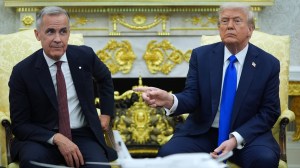Sergeant Musharraf’s lonely band
More than a month after parliamentary elections, Pakistan is still without a stable elected government and without a final date for convenin...

More than a month after parliamentary elections, Pakistan is still without a stable elected government and without a final date for convening Parliament. Apologists for the military’s intervention in politics are already arguing that Pakistan’s politicians are once again failing the nation. But the fact is that the current stalemate is the result of machinations by General Musharraf and his political engineers.
The delay in convening parliament, originally scheduled for November 1, is clearly intended to buy time for cobbling together a pro-military coalition, one that Musharraf can easily work with. Musharraf wants a deal with the Pakistan Peoples Party (PPP) but not with its leader, Benazir Bhutto. He wants the Islamic alliance, MMA, as part of a future government but does not want a cleric to be Prime Minister. In short, he wants the country’s politicians to fall in like a parade responds to the command of a sergeant.
The manner in which military officers are reportedly meeting politicians, leading to speculation about their involvement in political deal-making, is certainly not the ‘‘clean and healthy politics’’ Musharraf promised when he took power three years ago. If newspaper reports are to be believed, the Pakistani establishment is trying to wheel and deal in an unscrupulous manner making the generals look far worse than the politicians they say they want to control.
|
Election results show corruption allegations haven’t been sufficient to discredit Bhutto. Instead of trying to exclude her from politics, Musharraf should realise that politicians can only be defeated through political competition |
Musharraf would do well also to compromise with exiled former prime minister Benazir Bhutto, whose Pakistan Peoples Party (PPP) is the second-largest group in parliament. Bhutto and her husband Asif Ali Zardari have faced charges of corruption for the last six years after her government was dismissed on the basis of these allegations. Prosecution in the corruption cases has been painfully slow and so far there have been no final convictions. And Bhutto was convicted under a decree issued by Musharraf for failing to appear in a special court, which is not the same as being convicted for graft or bribery.
Election results show that the allegations have not been sufficient to discredit Bhutto and her party in the eyes of Pakistani voters. Instead of persisting with the folly of trying to exclude the Bhutto family or PPP from politics through judicial and manipulative means—something that has been tried for 25 years, without success—it may be prudent to finally recognise that politicians can only be truly defeated through political competition.
Once the constitutional package and the military-inspired corruption prosecutions are withdrawn, the conservatives currently considered Musharraf’s political pawns would be free to negotiate a coalition arrangement with the opposition parties. A coalition between secular parties of the centre-right and the centre-left would then become possible, denying the Islamists influence disproportionate to their electoral strength. If, however, the MMA can still strike a deal with the mainstream parties after compromising on core issues, they should not be denied the fruit of flexibility.
The MMA gained a significant number of seats in parliament with only 11% of the popular vote, and it will certainly form the government in the two provinces bordering Afghanistan. Islamist opposition to the presence of US forces conducting the war against al Qaeda could complicate Pakistan’s role as an indispensable US ally. But Pakistani parties, including the Islamists, are willing to maintain the alliance with the US if Washington supports normal democratic politics instead of putting all its weight behind Musharraf. From Washington’s point of view, this may not be a bad deal. A democratic regime, however flawed, is more likely to provide long-term stability to Pakistan.
|
American support for military rulers in the past has contributed to anti-Americanism in Pakistan. The US should firmly assert that a return to democracy in Pakistan is critical to the health of the new US-Pakistan partnership |
US support for military rulers in the past has contributed to anti-Americanism in Pakistan. Military rulers, including Musharraf, have used Islamic extremism as a strategic tool in pursuing Pakistan’s traditional rivalry with India. With 29% of the national budget allocated for defense and additional clout through state enterprises run by the military, the generals inhibit Pakistan’s economic development. Their repeated interventions have undermined the evolution of democratic institutions. Instead of appearing to support the military’s political role, the US should firmly assert that a return to democracy in Pakistan is critical to the long-term health of the new US-Pakistan partnership. It is time for Pakistan to stop going round in circles and to heed Cicero’s maxim, ‘‘Let the soldier yield to the civilian.’’
A senior US military officer recently asked me, ‘‘With all my sophisticated military training, I have never though myself capable of entering politics or running an electricity company. What makes military officers in Pakistan think that they can govern and run everything from the railways to the Karachi Electric Supply Corporation?’’ Perhaps General Franks can ask General Musharraf that question during their next meeting.
E-mail the Author



- 01
- 02
- 03
- 04
- 05




























